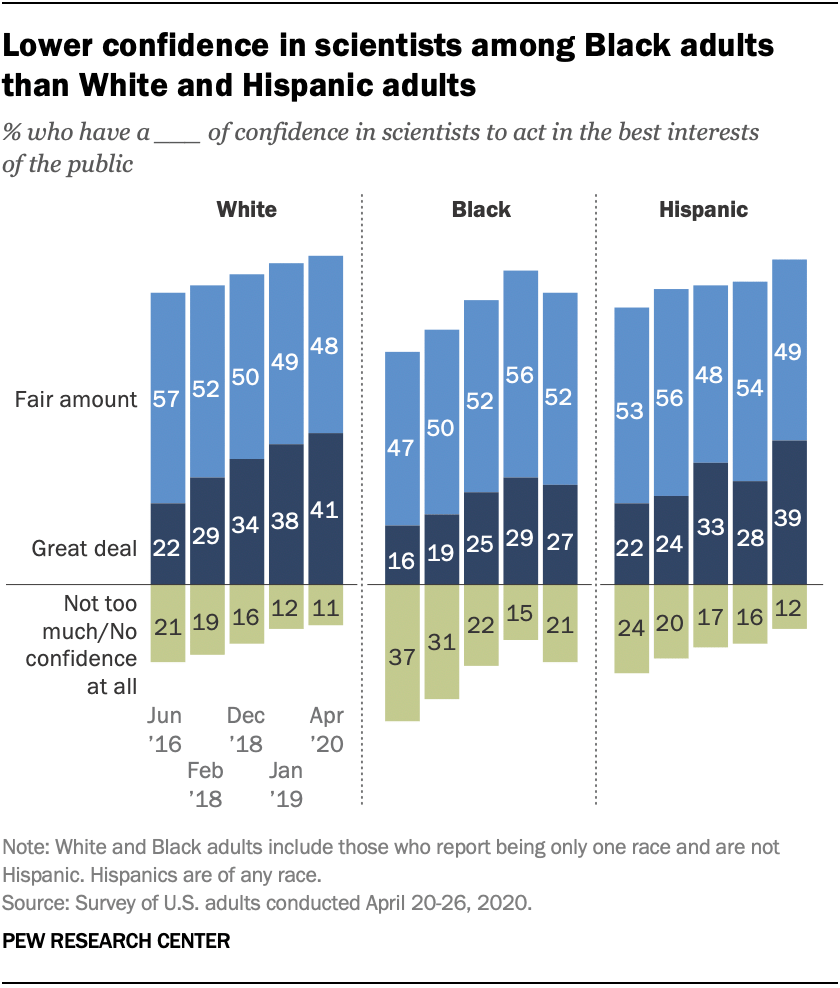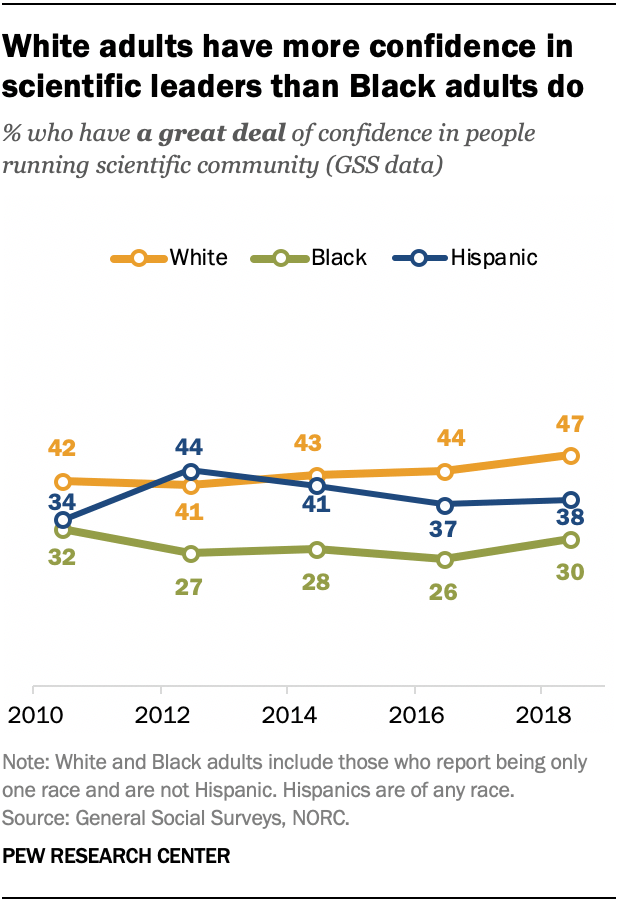Scientists are held in high esteem by most Americans, with public confidence in scientists outpacing that for other prominent groups, but Black adults are significantly less likely than White adults to share that view.
While views of scientists generally tilt positive, there’s a 14-point gap between the shares of White and Black adults who say they have a great deal of confidence in scientists (41% vs. 27%). And while most adults in both groups have at least a fair amount of confidence in scientists, Black adults are about twice as likely as White adults to say they have not too much or no confidence in scientists to act in the public interest (21% vs. 11%).
U.S. Hispanics rate scientists about the same as White adults do, expressing more confidence in them than Black adults do.
This analysis of Americans’ confidence in scientists is based on a survey of 10,139 U.S. adults conducted from April 20 to April 26, 2020. Everyone who took part is a member of Pew Research Center’s American Trends Panel (ATP), an online survey panel that is recruited through national, random sampling of residential addresses. This way nearly all U.S. adults have a chance of selection. The survey is weighted to be representative of the U.S. adult population by gender, race, ethnicity, partisan affiliation, education and other categories. Read more about the ATP’s methodology.
Here are the questions used for this report, along with responses, and its methodology.
This post also draws from the General Social Survey (GSS), a face-to-face survey conducted by NORC, an independent research organization at the University of Chicago. The GSS randomly selects households in the United States to participate. The most recent survey took place in 2018.
White Americans have been more likely than Black Americans to express a great deal of trust in scientists in each Center survey since 2016. This pattern also occurs in data from the General Social Survey from earlier years. The differences persist when taking into account other factors such as political party and education.
There are attitudinal differences between White and Black Americans on a range of issues related to science, including intent to get a COVID-19 vaccine. A recent Pew Research Center analysis found that 74% of White adults (and an identical share of Hispanics) said they would definitely or probably get a coronavirus vaccine, compared with 54% of Black adults who said this.
While Black Americans overwhelmingly identify with or lean toward the Democratic Party, and Democrats, as a group, tend to have more positive views of scientists than Republicans and those who lean toward the Republican party, the same divide by race holds true for Black and White Democrats. In the 2020 Pew Research Center survey, White Democrats are roughly twice as likely as Black Democrats to say they have a great deal of confidence in scientists to act in the best interests of the public (62% vs. 29%).
About a quarter (26%) of White Republicans have a great deal of confidence in scientists to act in the public interest, but there are not enough Black Republicans in the survey sample for separate analysis.
There are also differences between White and Black adults on a similar question in the most recent GSS. In 2018, that survey found that 47% of White adults had a great deal of confidence in leaders of the scientific community, compared with 30% of Black adults (a 17 percentage point difference). Overall, 55% of Black adults said they had “only some confidence” in scientific leaders, and 12% said they had hardly any confidence in scientific leaders. White adults were less likely to express these views: 46% had only some confidence in scientists and 5% had hardly any. The views of Hispanics fell between those of White and Black Americans.
The gap between Black and White adults has been consistent in GSS surveys over time. Penn State Professor Eric Plutzer found Black adults to have lower confidence in scientific leaders than White adults in a combined analysis of data from 2006 to 2010, even after controlling for education, science knowledge and other factors.
The gap between Black and White adults in confidence in scientists is larger than the gaps seen in ratings of most other groups. In the Center survey, the confidence gap is larger for scientists (14 points) than for any other group or institution rated, including the military, religious leaders and business leaders. Similarly, differences in confidence between Black and White Americans are largest for scientific leaders and the U.S. Supreme Court (17 points each) in the 2018 GSS survey.
These findings are in keeping with the more mixed views of Black Americans in their assessments of science and scientific research. In a 2019 Center survey, 59% of Black Americans said science has had a mostly positive effect on society, 34% said the effect has been an equal mix of positive and negative, and 6% said the effect has been mostly negative. By contrast, about eight-in-ten White Americans (78%) considered the effect of science on society to be mostly positive. Such findings align with data from the GSS in recent years showing that Black Americans are less inclined than White Americans to say the benefits of scientific research outweigh potential harms.
Note: Here are the questions used for this report, along with responses, and its methodology.




